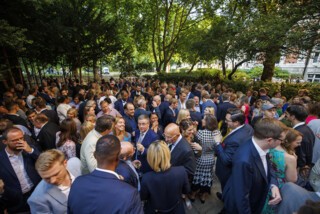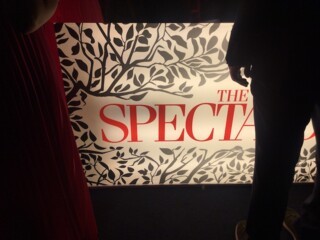Party Going
Inigo Thomas
The Spectator’s summer party was held this year on 7 July, on the evening of the day that had begun with Boris Johnson’s resignation. There are many reasons to want to go a party and one is curiosity. When I heard from a friend that he was going I asked if I could tag along. Johnson himself might not be at the party that he had once hosted, but the scene might be interesting – socially, politically, anthropologically, historically. ‘It was 11:30 a.m. when matters started to get heated,’ was the opening line of Johnson’s first article for the Times in 1988 – he was writing about a benefits office in Peckham. On 7 July 2022, matters at the Spectator offices in Westminster were already hot by 6 p.m.
I first went to the Spectator summer party years ago, when its offices were in a house on Doughty Street, Holborn. This was 1990, when I was at the LRB, and the paper had recently published a piece by Christopher Hitchens on the then owner of the Spectator, Conrad Black. The headline was ‘Heart of Darkness’ and there was a huge photograph of Black on the cover. Hitchens, who had once been the Spectator’s Washington correspondent, went to the party hoping for a confrontation with Black, and I went to see the action. We were out of luck: Black didn’t show up.
Among the reasons Johnson’s prime ministership came to an end were parties at Downing Street that should not have been held because of Covid restrictions. Now that party-going is allowed again, what are we to make of them? The Labour Party had a party the night before the Spectator’s and Keir Starmer gave a speech that some of his listeners said was everything his more public appearances are not. Television somehow irons out the personality.
There were no speeches at the Spectator party. It was held at the magazine’s offices in an early 20th-century building on Old Queen Street, set among 18th-century terraces studded with blue plaques. (A green plaque on the Ministry of Justice, put up by Westminster Council, says that Jeremy Bentham’s house once stood on the site.) I met my friend at the Two Chairmen, a pub nearby. The party was in the back garden which looks onto Bird Cage Walk and Green Park. At one point a military band marched by but the noise of the party chatter mostly drowned out the music, and no one seemed to notice the red-coated soldiers.
‘I don’t know what Anna Wintour means when she says that being sacked “forces you to look at yourself”,’ Alexander Chancellor once said (he was sacked as editor of the Spectator in 1984). ‘I look rather harder at my sackers.’ Had Johnson turned up to the party, he would have encountered quite a few of those who had forced him to resign. There was one secretary of state who had been fired (Michael Gove), another who had resigned (Rishi Sunak), others who had been promoted, including the new chancellor (Nadhim Zahawi) and his replacement as education secretary (James Cleverly).
Then there were the former and current radio and TV news presenters – Andrew Marr, Emily Maitlis, Nick Robinson, Robert Peston, Laura Kuenssberg – and many other journalists. Andrew Neil, who is the chairman of the Spectator as well as presenter of his own show on Channel 4, said that six hundred people turn up for the magazine’s party, but size gives a false impression of the occasion. Were you to look on at the scene for the first time you might be surprised or shocked at how intimate the relationships between politicians and journalists often are. Sunak was best man at the wedding of the Spectator’s political editor James Forsyth and Johnson’s former press secretary Allegra Stratton. Johnson and Gove both started out as journalists, and the roles of politician and media presenter have become more blurred than ever.
At one point I found myself talking (or listening) to the former leadership contender David Davis, about the way high definition television makes politicians look older than they are, and how he had travelled to Washington with Jeremy Corbyn to seek the release of a British inmate at Guantánamo. Time to go: I walked out into Old Queen Street with a copy of the latest issue of the magazine and aimed for Victoria Station.
The Spectator’s party is more of a Conservative party than it once was – I didn’t see any Labour or Liberal Democrat politicians – and it is more political, less literary and artistic. That, too, seems to be a sign of these times. The name of the next prime minister is not known, but the absence of Johnson from this gathering of Tories was conspicuous in a way that made you wonder whether the party has really given up on Johnson for ever, or whether the life he brings to its parties is too much for them to ignore.


Comments
This is not quite right.
Given the apparent absence of any LibDem or Labour politicians, would it not be more accurate to write:
"Were you to look on at the scene for the first time you might be surprised or shocked at how intimate the relationships between Tory politicians and journalists often are."